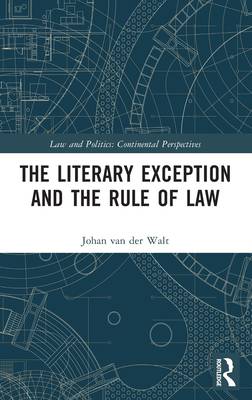
- Afhalen na 1 uur in een winkel met voorraad
- Gratis thuislevering in België vanaf € 30
- Ruim aanbod met 7 miljoen producten
- Afhalen na 1 uur in een winkel met voorraad
- Gratis thuislevering in België vanaf € 30
- Ruim aanbod met 7 miljoen producten
Omschrijving
Addressing the influential analysis of law and literature, this book offers a new perspective on their relationship. The law and literature movement that has gained global prominence in the course of last decades of the twentieth and the first decades of the twenty-first centuries has provided the research and teaching of law with a considerable body of new and valuable knowledge and understanding. Most of the knowledge and insights generated by the movement concern either a thematic overlap between legal and literary discourses - suggesting they deal with the same moral concerns - or a rhetorical, semiotic or general linguistic comparability or 'sameness' between them - imputing to both the same or very similar narrative structures. The Literary Exception and the Rule of Law recognises the wealth of knowledge generated by this approach to the relationship between law and literature, and acknowledges its debt to this genre of scholarship. It nevertheless also proposes, on the basis of a number of revealing phenomenological inquiries, a different approach to law and literary studies: one that emphasises the irreducible difference between law and literature. It does so with the firm believe that a regard for the very different and indeed opposite discursive trajectories of legal and literary language allows for a more profound understanding of the unique and indeed separate roles that the discourses of law and literature generally play in the sustenance of relatively stable legal cultures.
This important rethinking of the relationship between law and literature will appeal to scholars and students of legal theory, jurisprudence, philosophy, politics and literary theory.
Specificaties
Betrokkenen
- Auteur(s):
- Uitgeverij:
Inhoud
- Aantal bladzijden:
- 280
- Taal:
- Engels
- Reeks:
Eigenschappen
- Productcode (EAN):
- 9780367640316
- Verschijningsdatum:
- 20/07/2022
- Uitvoering:
- Hardcover
- Formaat:
- Genaaid
- Afmetingen:
- 156 mm x 234 mm
- Gewicht:
- 594 g

Alleen bij Standaard Boekhandel
Beoordelingen
We publiceren alleen reviews die voldoen aan de voorwaarden voor reviews. Bekijk onze voorwaarden voor reviews.











